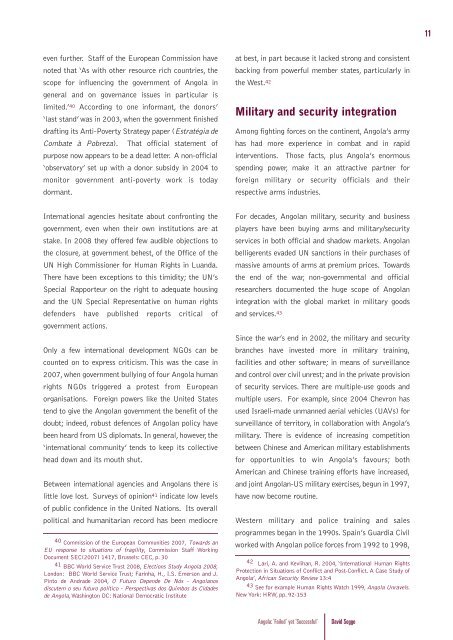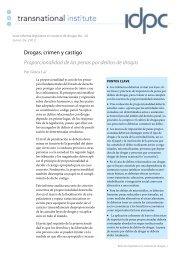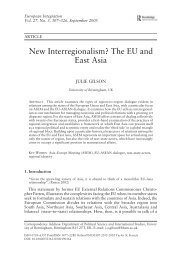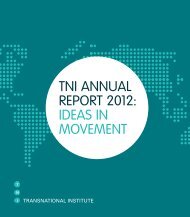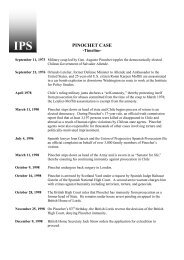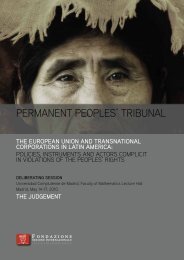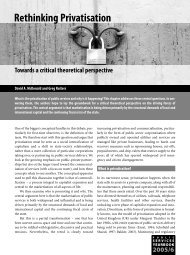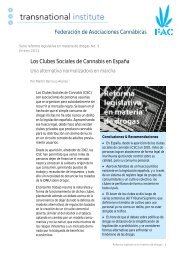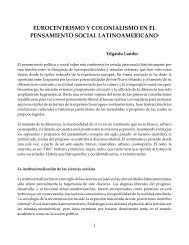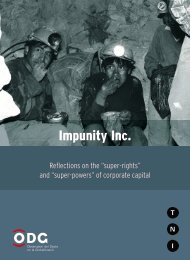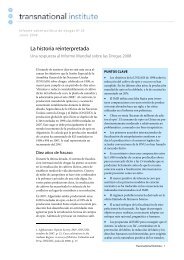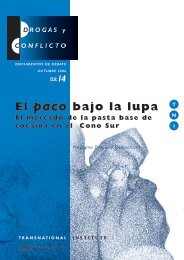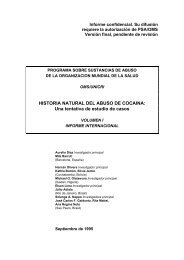Create successful ePaper yourself
Turn your PDF publications into a flip-book with our unique Google optimized e-Paper software.
11even further. Staff of the European Commission havenoted that ‘As with other resource rich countries, thescope for influencing the government of <strong>Angola</strong> ingeneral and on governance issues in particular islimited.’ 40 According to one informant, the donors’‘last stand’ was in 2003, when the government finisheddrafting its Anti-Poverty Strategy paper (Estratégia deCombate à Pobreza). That official statement ofpurpose now appears to be a dead letter. A non-official‘observatory’ set up with a donor subsidy in 2004 tomonitor government anti-poverty work is todaydormant.at best, in part because it lacked strong and consistentbacking from powerful member states, particularly inthe West. 42Military and security integrationAmong fighting forces on the continent, <strong>Angola</strong>’s armyhas had more experience in combat and in rapidinterventions. Those facts, plus <strong>Angola</strong>’s enormousspending power, make it an attractive partner forforeign military or security officials and theirrespective arms industries.International agencies hesitate about confronting thegovernment, even when their own institutions are atstake. In 2008 they offered few audible objections tothe closure, at government behest, of the Office of theUN High Commissioner for Human Rights in Luanda.There have been exceptions to this timidity; the UN’sSpecial Rapporteur on the right to adequate housingand the UN Special Representative on human rightsdefenders have published reports critical ofgovernment actions.Only a few international development NGOs can becounted on to express criticism. This was the case in2007, when government bullying of four <strong>Angola</strong> humanrights NGOs triggered a protest from Europeanorganisations. Foreign powers like the United Statestend to give the <strong>Angola</strong>n government the benefit of thedoubt; indeed, robust defences of <strong>Angola</strong>n policy havebeen heard from US diplomats. In general, however, the‘international community’ tends to keep its collectivehead down and its mouth shut.Between international agencies and <strong>Angola</strong>ns there islittle love lost. Surveys of opinion 41 indicate low levelsof public confidence in the United Nations. Its overallpolitical and humanitarian record has been mediocre40 Commission of the European Communities 2007, Towards anEU response to situations of fragility, Commission Staff WorkingDocument SEC(2007) 1417, Brussels: CEC, p. 3041 BBC World Service Trust 2008, Elections Study <strong>Angola</strong> 2008,London: BBC World Service Trust; Farinha, H., I.S. Emerson and J.Pinto de Andrade 2004, O Futuro Depende De Nós - <strong>Angola</strong>nosdiscutem o seu futuro político - Perspectivas dos Quimbos às Cidadesde <strong>Angola</strong>, Washington DC: National Democratic InstituteFor decades, <strong>Angola</strong>n military, security and businessplayers have been buying arms and military/securityservices in both official and shadow markets. <strong>Angola</strong>nbelligerents evaded UN sanctions in their purchases ofmassive amounts of arms at premium prices. Towardsthe end of the war, non-governmental and officialresearchers documented the huge scope of <strong>Angola</strong>nintegration with the global market in military goodsand services. 43Since the war’s end in 2002, the military and securitybranches have invested more in military training,facilities and other software; in means of surveillanceand control over civil unrest; and in the private provisionof security services. There are multiple-use goods andmultiple users. For example, since 2004 Chevron hasused Israeli-made unmanned aerial vehicles (UAVs) forsurveillance of territory, in collaboration with <strong>Angola</strong>’smilitary. There is evidence of increasing competitionbetween Chinese and American military establishmentsfor opportunities to win <strong>Angola</strong>’s favours; bothAmerican and Chinese training efforts have increased,and joint <strong>Angola</strong>n-US military exercises, begun in 1997,have now become routine.Western military and police training and salesprogrammes began in the 1990s. Spain’s Guardia Civilworked with <strong>Angola</strong>n police forces from 1992 to 1998,42 Lari, A. and Kevlihan, R. 2004, ‘International Human RightsProtection in Situations of Conflict and Post-Conflict. A Case Study of<strong>Angola</strong>’, African Security Review 13:443 See for example Human Rights Watch 1999, <strong>Angola</strong> Unravels.New York: HRW, pp. 92-153<strong>Angola</strong>: ‘Failed’ <strong>yet</strong> ‘Successful’David Sogge


